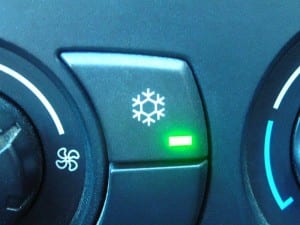Debate over the so-called “dirty little secret” of AC fluid muddies the merits of electric vehicles.
Why? Electrification of transportation is an important solution to reduce oil use and global warming emissions. The obvious advantage of electric vehicles (EVs) over conventional cars and trucks is the lack of tailpipe exhaust, meaning the elimination of both smog-forming pollution and carbon dioxide production from the vehicle. Even factoring in the emissions to produce electricity, the benefits of using EVs are significant. In California using an EV like the Nissan Leaf produces 63% less global warming emissions than the average new compact gasoline vehicle.
However, a recent article claims that EVs have a “dirty little secret”: some have a potent greenhouse gas called HFC-134a in their air conditioning (AC) system. The fact that most EVs have HFC-134a in their AC system is true, but the “dirty little secret” characterization is disingenuous for several reasons.

First, this compound (HFC-134a, also known as R-134a) is found in almost all vehicles built after 1994 on the road today, not just in some electric vehicles! When assessing the benefits of EVs, we can’t look at these vehicles in isolation; we need to compare them to the current alternatives. In the case of global warming emissions from AC system leaks, there’s little if any difference between EVs and conventional vehicles.
Second, the global warming impact of HFC-134a leaking from AC units is small compared to that of burning of gasoline. TheEPA has estimated that the HFC-134a that leaks over a new vehicle’s lifetime produces the equivalent of about 18 grams CO2 per mile. The emissions produced from using gasoline in a 29 mpg car is about 386 grams CO2 per mile or over 21 times higher than the emissions from AC leaks. We shouldn’t ignore the effect of AC refrigerant on global warming emissions, but reducing the amount gasoline we burn will have the most significant impact on emissions.
Reducing emissions from leaking vehicle AC systems is possible. In fact, the current EPA vehicle emissions standards encourage the use of more climate-friendly refrigerants and there are options available today that reduce the emissions from AC leaks to nearly zero. One option, HFO-1234yf, is already in use in 9 car models, including 2 EVs. We can and should replace HFC-134a in all vehicles with alternatives that are safe, effective, and produce less global warming emissions. However, it doesn’t make sense to look at a relatively minor emissions source that is shared by electric AND conventional vehicles and call it electric vehicle’s “dirty little secret”.
Source: UCSUSA. Reproduced with permission.










